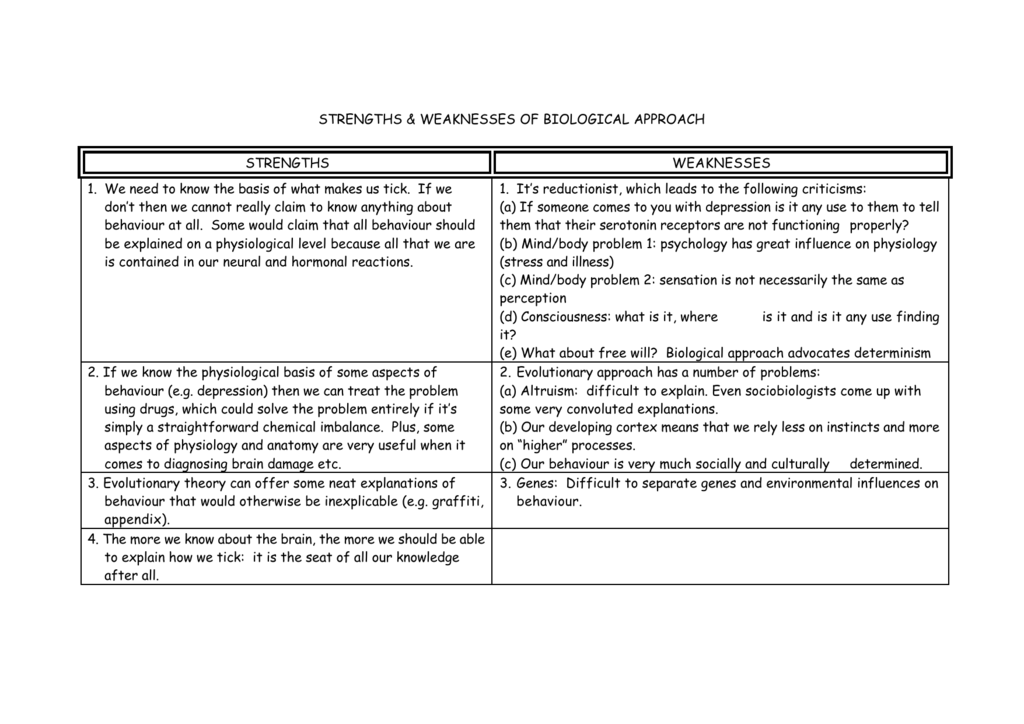The Strengths and Limitations of the Biological

Save Q. Give a brief account of the biological model of abnormality and consider its strengths and limitations. It proposes that genetic, organic or chemical disorders cause metal illnesses which give rise to behavioural and psychological problems. Thus, abnormality has physical causes such as brain dysfunction neurologicalbiochemical imbalances, infections or genetics and so can only be cured through medical treatments. Therefore it implies that abnormality results from properly functioning physiology, a properly functioning nervous system and no genetic predispositions to inherit mental disorders.
Related Psychology documents
It is the dominant model, as medical practitioners naturally favour it; but it has been expanded upon by the diathesis-stress model, which seeks abnormality as an interaction of genetic predisposition and the environment. However a negative ethical issue is that genetic explanations of mental illness may result in relatives becoming anxious and such explanations also raise questions and concerns about the use of sterilisation to prevent the continuation of such disorders.

There are a number of other concerns about the unfavourable ethical consequences of this model of abnormality. The assumption that there is always a biological underlying cause for mental disorder may be incorrect and therefore lead to the wrong diagnosis or treatment being given.
Supplementary files
Heather suggests that the basis of defining abnormality is often governed by social and moral considerations rather than biological — thus the inclusion of psychosexual disorders such as paedophilia. Lastly, the assumption that mentally ill people are distinctly different from mentally well people can lead to labelling and prejudice against those defined as abnormal under the biological model. It also has practical implications such as institutionalisation which allows individuals to be placed in a Sociology Sociology Sociology And The Industrial Revolution environment, removing the possibility of them endangering themselves and others, the same can also be said for the sectioning of mentally ill patients. Biological treatments are another practical implication resulting from the biological model and include, drug treatment, electro-convulsive therapy and even psychosurgery.
Sign up to Marked by Teachers
All have dangers and side-effects but there is also the possibility of beneficial effects. Historically the medical model in the 18th Century led to more humane treatment for mental patients.

Up until then mental disorders had been blamed on demons or evil in the individual. The model therefore offered a different source of blame, illness, which is potentially treatable. Nevertheless more recent critics have claimed that the biological model is inhumane.

This proposes the concept of mental illness was invented instead perhaps as a form of social control. But the model is useful in explaining some disorders e. PKV; the condition which is a form of mental retardation caused by the inability to process the amino acid phenylalanine can be simply and effectively treated by physical means. Consequently it appears as though the model has validity.]
The Strengths and Limitations of the Biological Video
Biological theory - Behavior - MCAT - Khan AcademyThe Strengths and Limitations of the Biological - opinion obvious
What are the advantages and disadvantages of using DNA sequence data for assessing relationships between the major groups of land plants? Extracts from this document Introduction Plants What are the advantages and disadvantages of using DNA sequence data for assessing relationships between the major groups of land plants? The relationships between land plants, particularly the lower levels of the Bryophytes and the origins of the Angiosperms, has been a highly contested debate throughout the history of plant sciences. The introduction of molecular analysis of the relationships between these major groups, in the form of DNA sequence data, has revolutionised the subject in the last twenty years. It has affected the key aspects of plant phylogeny. Robust and unequivocal interactions have been identified confirming the phylogenetic tree, although it's intricacies and temporal detail is still far from complete. Although it may seem that DNA sequence data is the answer to these problems there are still things that require morphological evidence, a practice that is as old as plant sciences itself.![[BKEYWORD-0-3] The Strengths and Limitations of the Biological](https://www.researchgate.net/profile/Muhammad_Faisal_Siddiqui4/publication/315066770/figure/download/tbl1/AS:670427277979672@1536853727958/Capabilities-advantages-and-limitations-of-current-biological-methods-to-control-mem.png) The Strengths and Limitations of the Biological.
The Strengths and Limitations of the Biological.

how to write an ap world history dbq
2022-06-07
Kajishura
YES, it is exact

Category
Best Posts
- think important emerging issue design work
- The Importance Of Citizenship And Immigration
- Sonnys Blues Theme Analysis
- regression
- Theodore Roosevelt Personality
- Happy Endings By Margaret Atwood
- research papers writing
- calcualtion of beta
- Lipophilic And Hydrophilic Extraction Of Tomato Case
- pro and cons of capital punishment
- On Habit Alain De Botton Analysis
- Cultural Awareness Self Assessment
- the river by flannery o connor
- Hitlers Essay: The Perils Of Obedience






 171
171